
Watson's Choice is a 1955 mystery detective novel by the British writer Gladys Mitchell. It is the twenty eight in her long-running series featuring the psychoanalyst and amateur detective Mrs Bradley.
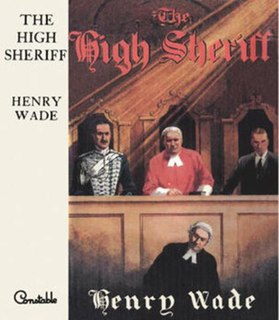
The High Sheriff is a 1937 mystery detective novel by the British writer Henry Wade. Wade was a writer of the Golden Age of Detective Fiction, best known for his series featuring Inspector Poole. This was one of a number of stand-alone novels he wrote, structured as a partially inverted detective story.
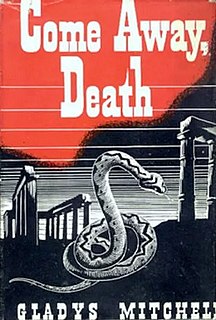
Come Away, Death is a 1937 mystery detective novel by the British writer Gladys Mitchell. It is the eight in her long-running series featuring the psychoanalyst and amateur detective Mrs Bradley. Although the plot revolves around Greek Mythology, the title is taken from a line from Shakespeare's Twelfth Night. It was followed by a loose sequel Lament for Leto in 1971.
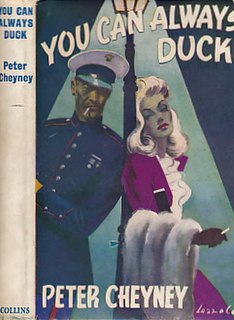
You Can Always Duck is a 1943 thriller novel by the British writer Peter Cheyney. It is the ninth in his series of novels featuring the FBI agent Lemmy Caution. The action takes place in wartime London where Caution is on the trail of a gang of black marketeers who have got mixed up in espionage. It was one of a number of films and novels of the period that made use of the booming black market for their setting.

Never a Dull Moment is a 1942 thriller novel by the British writer Peter Cheyney. It is the eight in his series of novels featuring the FBI agent Lemmy Caution. Cheyney had become known for his hardboiled style, similar to that of Raymond Chandler.

You'd Be Surprised is a 1940 thriller novel by the British writer Peter Cheyney. It is the sixth in his series of novels featuring the FBI agent Lemmy Caution. Unlike several of the others it has not been adapted for film.
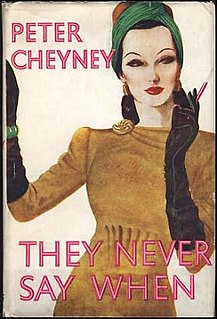
They Never Say When is a 1944 thriller novel by the British writer Peter Cheyney. It is the sixth in his series of novels featuring the London private detective Slim Callaghan, a British version of the increasingly popular hardboiled American detectives.

Uneasy Terms is a 1946 crime thriller novel by the British writer Peter Cheyney. It was the seventh and last in his series featuring the London-based private detective Slim Callaghan, a British version of the hardboiled heroes of American writing.

Sorry You've Been Troubled is a 1942 thriller novel by the British writer Peter Cheyney. It was the fifth book in his series featuring the hardboiled London-based private detective Slim Callaghan. It was published in the United States under the alternative title of Farewell to the Admiral.
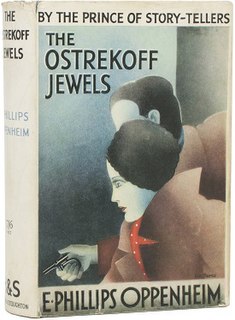
The Ostrekoff Jewels is a 1932 thriller novel by the British writer E. Phillips Oppenheim. It was published in the United States by Little, Brown.

The Million Pound Deposit is a 1930 thriller novel by the British writer E. Phillips Oppenheim. It was published in the United States by Little, Brown.
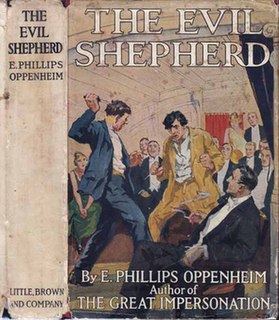
The Evil Shepherd is a 1922 mystery thriller novel by the British writer E. Phillips Oppenheim. It was published in the United States by Little, Brown. Oppenheim was a prolific writer whose novels enjoyed great popularity during the era.

A Lost Leader is a 1906 politically-themed novel by British writer E. Phillips Oppenheim. Later better known for his thrillers, it was one of several novels Oppenheim wrote at the time centred on "social political life". In it, a potential Liberal Party politician, Lawrence Mannering, is lured back from his country estate to London to revive the party's fortunes.

The Golden Beast is a 1926 mystery thriller novel by the British writer E. Phillips Oppenheim. Oppenheim was prolific, bestselling author whose popularity reached its height during the interwar years. The novel was published in America by Little, Brown.

Jacob's Ladder is a 1921 thriller novel by the British writer E. Phillips Oppenheim. Oppenheim was prolific, bestselling author whose popularity reached its height during the interwar years. The novel was published in America by Little, Brown.
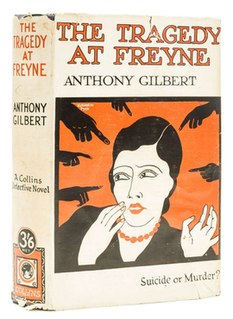
The Tragedy at Freyne is a 1927 mystery detective novel by Anthony Gilbert, the pen name of British writer Lucy Beatrice Malleson. Her first novel under the pseudonym, it introduced the amateur detective Scott Egerton who was her principle character until the creation of Arthur Crook in Murder by Experts.

Death at Four Corners is a 1929 mystery detective novel by Anthony Gilbert, the pen name of British writer Lucy Beatrice Malleson. It is the third novel in a series featuring her amateur detective Scott Egerton.

The Mystery of the Open Window is a 1929 mystery detective novel by Anthony Gilbert, the pen name of British writer Lucy Beatrice Malleson. It is the fourth novel in a series featuring her amateur detective, the politician Scott Egerton. Unlike the rest of the series it was published by Gollancz rather than Collins. It takes the form of a locked room mystery, a popular branch of the genre during the Golden Age of Detective Fiction.

Poison for One is a 1934 detective novel by John Rhode, the pen name of the British writer Cecil Street. It is the eighteenth in his long-running series of novels featuring Lancelot Priestley, a Golden Age armchair detective. It combines elements of the locked room mystery and country house mystery. Reviewing the book in the Sunday Times leading crime writer Dorothy L. Sayers considered it "as usual, sound, pleasantly written, and entertaining" although she complained the book "was rather spoilt for me by the jacket, which deliberately gives away one-half of the solution."

The Claverton Mystery is a 1933 detective novel by John Rhode, the pen name of the British writer Cecil Street. It is the fifteenth in his long-running series of novels featuring Lancelot Priestley, a Golden Age armchair detective. It was published in the United States by Dodd Mead with the altered title The Claverton Affair. The tone of the book has been described as much darker than the author's other novels.




















